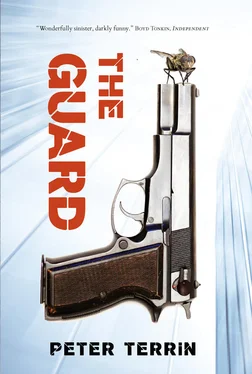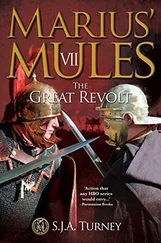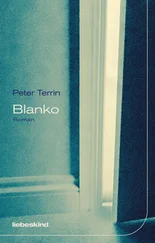66
His muscles are on the point of snapping. All at once they will break free of his knees and whip back, curling up toward his abdomen. He’s too big for this bike, but he had no choice. The only taxis in sight were already taken. He ran down the pavement in a panic, crossed the street several times and frenetically searched the memory of his telephone for numbers. The shortest waiting time a taxi company could offer him was fifteen minutes. In reality that meant at least half an hour, assuming it was an experienced driver who knew the shortcuts in this permanently clogged city, where a car could get up to twenty kilometers an hour at most. He studied the drivers in the traffic jam through their side windows, trying to make out a friendly face behind the reflections of the neon-lit night, someone who might listen to his pleas. Then he saw a bicycle leaning on the fence of a small park, a remarkable sight. The days of casually chaining bikes to rails, posts or trees are long gone. The old lady’s bike was leaning against the wrought-iron fence at quite an angle, like someone who’s suddenly been taken sick. He couldn’t see a chain or lock. There was nobody in the vicinity paying any attention to the bike; people walked past it as if it was a beggar or a street kid. When he focused on it, it seemed to be located in a parallel world that had nothing to do with the bored drivers and indifferent pedestrians. A world in which they were predestined to come together. He ran across the street, grabbed the handlebars without stopping and jumped onto the wide seat. Within the first five meters he felt the bike’s abnormal resistance, something wrong with the crankshaft. It wasn’t that bad, but he had a long way to go. The fear of getting totally exhausted halfway and having to dump the bike against a fence somewhere was not unfounded. Except he had no choice. Halfway would at least be halfway. Mapping out the route in his mind’s eye, he saw the angular patch he’d have to cycle around. He only hesitated a few seconds. Sweating and panting, he turned down the first side street. He ignored the warnings, relatively bland symbols on a prohibited entry sign. Fifty meters farther along a bright light flashed intermittently over similar signs, to which a blue rectangle with flashing electric letters had been added. He read, Attention! Or, Warning! Or, Reminder! He jolted over street markings and speed bumps. He passed immense signs with the universal phrases in various languages, beacons in the night, unpleasant gusts of hot air on his overheated face. No barriers. A weathered plywood sentry box in the middle of the pavement betrayed how temporary people had first estimated this problem to be. No longer manned. According to article such and such one enters the zone at one’s own risk. Emergency services won’t come this far for anyone. Without thinking, he keeps pedaling, turning into a long dark street flanked by tower blocks, the street that cuts straight through the zone and will get him to his wife in a third of the time. She’s in the delivery room, scared, it’s all happened very quickly. He has to be quick too, faster. He too has to push his body to its limits. If he becomes one with his effort, clenched from head to foot, an immense fist, his body will be impenetrable. The virus has dozed off, weakened, it can’t keep up with him. He feels the wind in his hair, he sees the meters passing under his wheels. He won’t tell his wife. He’ll get there in time to witness the birth of his son.
67
Harry and I have had a miraculous escape. In some fortuitous way, this space has saved us from a painful death. Either that or we have the dumb luck of simply being immune. The organization was prepared to sacrifice us to save the building from mass looting, but the looters were terrified and never materialized. People outside of the protective ring don’t know we’re living in this basement. The remaining resident is sprawled on a carpet somewhere in his apartment, on a handmade Oriental carpet. Lying there untidily like a dropped handkerchief. The carpet has been completely ruined. The juices that have leaked out of his decomposing body have eaten away at the fibers. He is still dressed in black. Shoes, watch, glasses. We were mistaken about his staff: they, of course, left with the other domestics. He misjudged the situation. He stayed a day too long. He thought it would all blow over. He wanted to show how fearless he was. He wanted to stay with the precious heirlooms inhabited by the soul of his late lamented mother. He was penniless. He had nothing left, everything had been sold: land, thoroughbreds, shares, yacht. The apartment had been stripped. He had nowhere to go. He didn’t know where to hide. He took a gamble. He preferred the risk of the virus to the certainty of shame.
68
I spend a full hour standing at the crack to listen to the city. I try to put the cyclist out of my mind so I can resume my inspection round. On the way to the bunkroom, I can’t control myself; I cross the basement and march back to the entrance gate.
That night I only do half rounds.
In the nights that follow I put the stool next to the gate. Now and then I walk a short distance so that I can peek around the corner of Garage 1 at the elevators and our room. Most of the time I stand at the crack, swapping ears regularly; the draft is cold. I get a headache from concentrating so hard in an attempt to sift the slightest of sounds out of the silence. I hear what I think is the extra tension on my eardrums, or the murmur of my overheated brain. I am aware of the danger of hallucination. The silence is like a desert.
69
By breaking the silence the cyclist has confirmed it. He’s locked it down. The sound of his passing was the turning of the key. There is no one left in the city except an idiot on an old bike and two guards in a basement. Harry was wrong. There is no last resident left in the building; after all this time we would have picked up some sign of life. Everyone’s gone, everyone has fled. The city wasn’t evacuated, its inhabitants just ran for it. Harry, me and the crazy cyclist have been left behind. No one informed us. Just as some people predicted, a new kind of war has arrived — conveniently referred to as the New War. A war whose very existence is subject to question, no one knowing whether it’s already raging or yet to start. Something from a futuristic novel. The weapons and the wounds they cause, the objectives and which parties have set them are anybody’s guess. And that is the chief characteristic of this world war. That’s what makes everyone flee: the enemy is unknown.
We’ve slipped off the organization’s radar. After a nuclear strike on the south coast they would have come to pick us up. After a bioterrorist attack they would have done everything in their power to lift the quarantine in this crucial part of the city as quickly as possible. Harry and I have been left behind. There is no longer anyone here for us to protect and no concrete threat to the building. Our ongoing posting here is an administrative oversight made by a commander who has cracked under the pressure. That’s why we no longer hear anything from the organization — not because we’re carrying on in silence and doing such an excellent job. That’s why the guard doesn’t show up. They’ve forgotten us.
The driver has secretly stockpiled tins in the warehouse. He’s delivered them to us in cardboard boxes, not the usual hard plastic trays. He has tried to amuse us with jokes. Gradually it’s been getting too risky for him and he decided to postpone resupplying us for a week, eight days, he decided to come at night. He was not particularly pleased with the way Harry goaded him, but he showed that he understood the reaction, he didn’t get angry. And as for us, we can be glad he still brings anything.
Читать дальше












